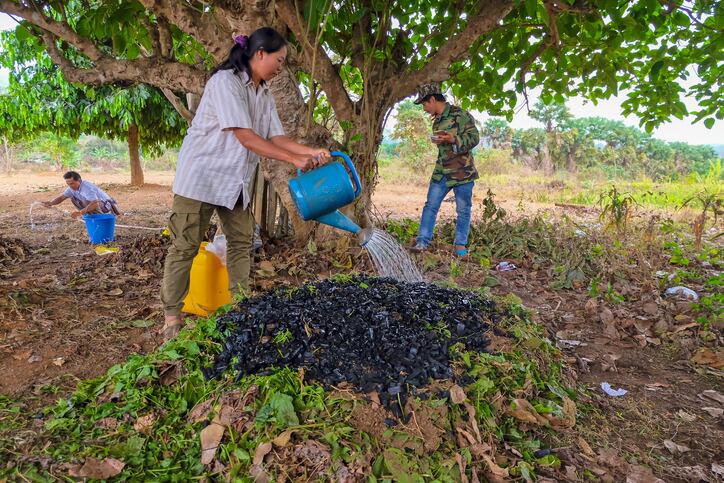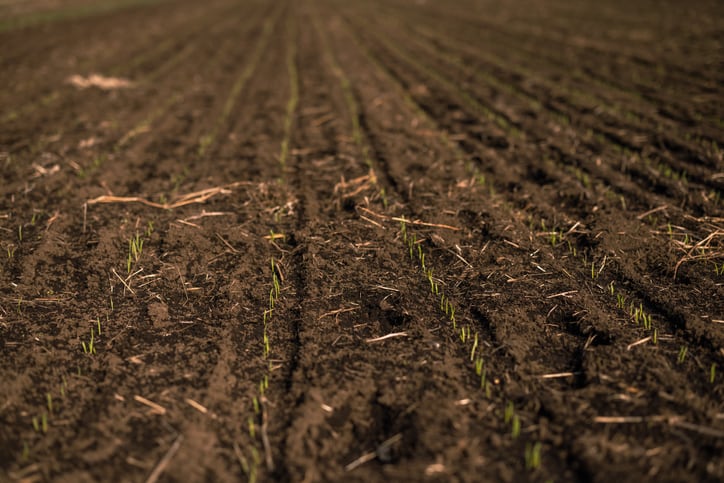Biochar is a charcoal-like residual product of carbon and ashes produced from bio-mass pyrolysis, i.e., plant materials — such as grass, agricultural and forest residues — decomposed at high temperatures, often during renewable energy production.
The versatility of biochar in agriculture has positioned it as a powerful tool for enhancing soil health and crop productivity, as well as aligning with global sustainability goals. The integration of biochar into agricultural contexts has emerged as a mutually advantageous approach, contributing not only to environmental restoration but also advancing ecological sustainability.
Reviewing environmental remediation effects
A recent comprehensive review has delved into the latest trends and applications of biochar, shedding light on its potential benefits for a greener environment. The study, led by researchers at China’s Northwest A&F University and India’s Saveetha Institute of Medical and Technical Sciences (SIMATS), scrutinised the diverse applications of biochar, considering the types of feedstocks and pyrolysis processes involved.
The research focused on the multi-faceted benefits of biochar and explored its role in enhancing crop yields, improving nutrient availability, supporting co-composting, water restoration and overall usage efficiency. Mechanistic evidence supporting these claims was thoroughly evaluated. The study also identified research gaps and proposed future directions for a deeper understanding of biochar applications.
The review highlighted biochar’s capacity to improve agricultural output, soil fertility, aeration, nutrient availability, and water filtering. Various methods of biochar application, including soil enhancement, moisture preservation, and incorporation into concrete, were discussed, emphasising its reputation as a green soil amendment.
When integrated into soil, biochar acts as a carbon sink, promoting water retention, nutrient availability and microbial activity. Its porous structure provides a habitat for beneficial micro-organisms, fostering a balanced and fertile soil ecosystem.
Moreover, biochar has been lauded for its ability to sequester carbon dioxide, mitigating the impact of greenhouse gas (GHG) emissions on the environment. As a soil amendment, it reduces the need for synthetic fertilisers, curbing nitrogen runoff and subsequent water pollution.
By sequestering carbon in the soil, biochar aids in climate change mitigation, contributing to the reduction of atmospheric carbon dioxide (CO2) levels. Its incorporation into farming practices also addresses concerns related to soil degradation and erosion.
Furthermore, the use of biochar presents an opportunity to repurpose organic waste, reducing the burden on landfills and promoting a circular economy. The production of biochar from agricultural residues transforms what would otherwise be considered waste into a valuable resource for enhancing soil fertility.
Char-llenges and concerns
While biochar demonstrates immense potential, challenges such as standardised production methods, scalability and economic viability must be addressed in order to facilitate widespread adoption. Concerns have also been raised regarding potential impacts on human health within agricultural sectors.
Currently, there are ongoing research and development (R&D) efforts to optimise biochar production techniques and explore its long-term effects on different soil types and crops. While acknowledging biochar's positive impact, the study also urged caution, considering potential negative effects such as alterations in soil pH and the introduction of toxic chemical properties.
One primary concern biochar’s potential to induce soil acidification. Certain types of biochar can alter soil pH, making it more acidic and leading to a negative effect on crop growth and nutrient availability; this poses a threat to agricultural productivity.
Another concern is biochar's influence on soil microbial communities. While some studies suggest a positive correlation with increased microbial activity, others highlight the potential for imbalances in microbial populations. Such disruptions could lead to unforeseen consequences, including reduced nutrient cycling and compromised soil health.
Furthermore, contrary to its role as a carbon sink, biochar production and application may contribute to GHG emissions. The pyrolysis process that produces biochar releases volatile organic compounds and CO2. Additionally, when applied to soil, biochar can interact with soil organic matter, potentially leading to the release of stored carbon and negating its carbon sequestration benefits.
There are also water quality concerns due to run-off from fields treated with biochar. Leaching of ash and other residual components from biochar into water bodies may have adverse effects on aquatic ecosystems, potentially leading to nutrient imbalances and water pollution.
Future indications for more robust applications
The review concluded by discussing the role of biochar in circular environmental management in agriculture and speculating on future advancements in advanced biochar research. The researchers emphasised the importance of sustainable manufacturing techniques and the integration of biochar synthesis with other processes for a more environmentally friendly future.
As the agricultural sector seeks sustainable alternatives to conventional practices, the emergence of biochar marks a significant step towards a greener and more resilient future. Its integration into farming methodologies not only enhances productivity but also contributes to a more balanced and sustainable ecosystem, aligning with global initiatives to combat climate change and preserve the environment.
However, as biochar continues to be promoted as a sustainable agricultural practice, it is also imperative that policymakers, scientists and farmers consider its potential negative impacts seriously. Balancing the benefits and risks of biochar application is crucial to ensuring sustainable and resilient agricultural practices in the years to come.
Source: Bioresource Technology
“Comprehensive review on recent production trends and applications of biochar for greener environment”
https://doi.org/10.1016/j.biortech.2023.129725
Authors: Sivasubramanian Manikandan, et al.




